英语专业学生外语隐喻能力实证研究
- 格式:pdf
- 大小:32.14 KB
- 文档页数:7

隐喻功能视阙下的大学英语阅读教学实证研究学科分类:高等教育课题类别:重点课题关键词:隐喻,隐喻功能,大学英语阅读教学预期研究成果:研究报告课题设计论证1.问题的提出、课题界定、国内外研究现状述评、选题意义与研究价值。
问题的提出:隐喻作为一种语言现象,普遍存在于大学英语的阅读教材里。
目前,鲜有教材用专门的篇幅介绍它,只有个别单元的课后练习题里粗略地提到这种修辞手法,没有相对系统地、有针对性地、详细介绍隐喻的认知机制,也没有大量的练习题和补充性的材料帮助学生加强和巩固这部分知识。
如果老师不讲解,学生几乎没有任何渠道或意识去了解和掌握它。
作为人类最基本的认知方式,隐喻经常被人们有意或无意识地运用到话语或语篇中,来间接地表达所思所想。
因此,如果不了解隐喻的认知机制、隐喻的功能以及其在语篇中发挥的作用,学生很难深度地理解文章的中心意思。
鉴于此,本研究尝试地从隐喻功能的角度探究其在大学英语阅读教学中的驱动作用,以期为促进大学英语阅读教学、提高学生的阅读水平提供一个视角和方法。
课题界定:本课题的名称是“隐喻功能视阙下的大学英语阅读教学实证研究”。
本研究探讨的是隐喻的5大功能:修辞功能、认知功能、语篇功能、语用功能和文化功能。
大学英语阅读教学主要指的是,大一、大二期间大学英语作为必修课的教学。
国内外研究现状述评:国外的学者就隐喻和阅读的研究更关注于隐喻在专门用途英语(ESP)方面的应用。
Marisol Velasco Sacristán (2005)表明隐喻在第二语言商务英语学习者的教学中是一种有用的手段:有助于提高二语学习者技术和半技术词汇的意识和专业阅读水平。
Frank Boers (2000)通过一个小规模的实验证明提高语言学习者的隐喻意识对他们的专业阅读是有好处的。
国内的学者很早就注意到隐喻对于大学英语教学的重要意义。
刘祥云(2011)指出,运用隐喻研究成果来指导外语教学,已经成为目前语言学研究中的一个重要课题。
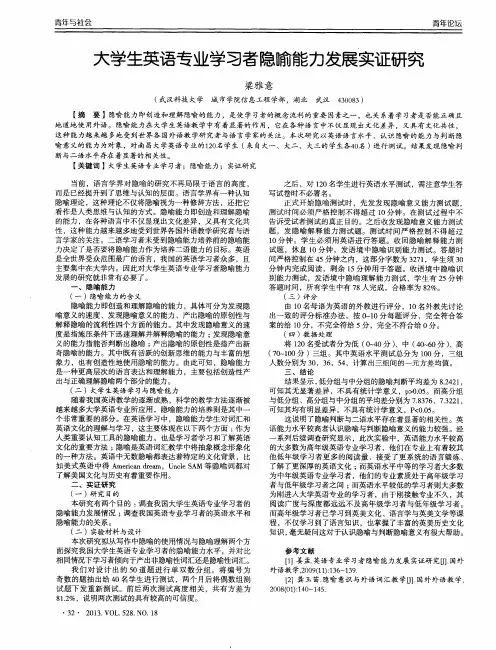

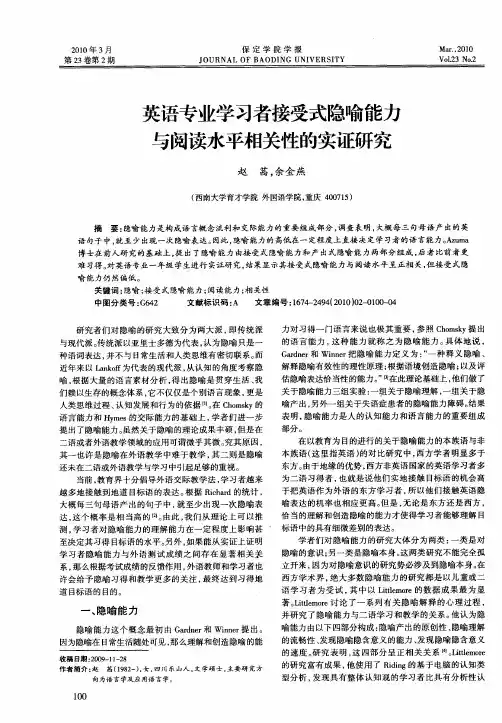

大学英语教学中隐喻能力的培养与提高研究摘要隐喻对于认知分析是一种非常有效的工具,同时也是学习语言的必要途径。
通过实验对非英语专业的学生进行一学期、专业隐喻能力培养,通过实验组和对照组进行试验后成绩进行对比检验,实验表明通过培养学生隐喻意识以及隐喻能力,学生的英语学习能力和学习成绩有着十分显著地提成,是学习英语并提高英语的有效途径,使得隐喻能力的培养引起英语教师的高度重视。
关键词大学英语教学;隐喻能力;培养与提高对于现代隐喻理论的解释为不仅是一种语言上的现象,而且还是一种人类认知现象。
隐喻能力的掌握也成为一种语言掌握的重要标志。
在进行外语教学过程中,虽说学生们已经掌握母语,也可以说掌握了母语的隐喻认知机制,但是在实际教学上,学生们学习的目标语认知机制却与学生本身掌握的认知机制是存在差异的。
如何使学生认识到这种现象并将这两者之间的差异抹除是英语教师教学过程中最困难的难题。
一、“隐喻能力”的概念提出与界定1890年,隐喻能力被首次提出,提出者认为隐喻通过类比的方式对一种事物的认知转变对另一种事物的认知,其在语言发展中起着至关重要的作用。
而且对于隐喻的定义含义为:识解隐喻,通过在恰当的环境中使用,并且判断在同一环境下可表达的多种隐喻的优劣能力。
随之将隐喻概念首次引进外语教学,并且认为隐喻能力可以让外语学习者识别并使用新奇隐喻能力,还将成为学习者成功熟练掌握所学语言的标志。
主要包括语言在语境中使用的适当性和工具性这两大方面。
隐喻提出者对于隐喻能力主要包含四个方面:第一,创造隐喻的能力;第二,隐喻意义的发现能力;第三,对隐喻意义的提取速度;第四,解释出隐喻含义的流利性。
对于这四个方面,第一个方面应该是使用者本身具备的,但是后三个方面则是隐喻学习者对于隐喻的理解能力。
隐喻能力是指人们能够识别、理解以及创建跨域概念类比联系的能力,不单单是单纯的理解和学习隐喻,还包括对隐喻能力的创造性使用,更高目标的包括丰富的想象力以及活跃的创新型细微。
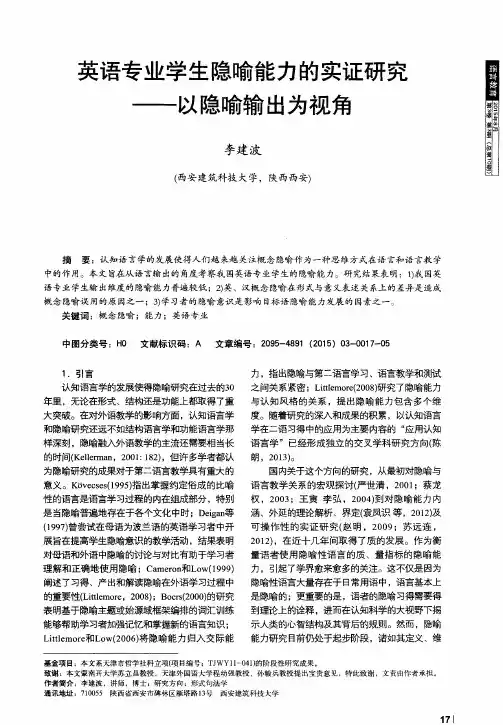
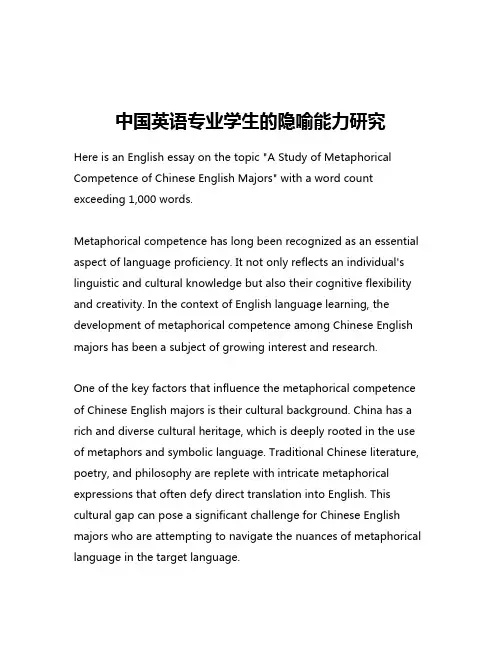
中国英语专业学生的隐喻能力研究Here is an English essay on the topic "A Study of Metaphorical Competence of Chinese English Majors" with a word count exceeding 1,000 words.Metaphorical competence has long been recognized as an essential aspect of language proficiency. It not only reflects an individual's linguistic and cultural knowledge but also their cognitive flexibility and creativity. In the context of English language learning, the development of metaphorical competence among Chinese English majors has been a subject of growing interest and research.One of the key factors that influence the metaphorical competence of Chinese English majors is their cultural background. China has a rich and diverse cultural heritage, which is deeply rooted in the use of metaphors and symbolic language. Traditional Chinese literature, poetry, and philosophy are replete with intricate metaphorical expressions that often defy direct translation into English. This cultural gap can pose a significant challenge for Chinese English majors who are attempting to navigate the nuances of metaphorical language in the target language.Moreover, the teaching and learning of metaphorical competence in the context of English language education in China have their own unique characteristics. Traditionally, the focus of English language instruction has been on the mastery of grammar, vocabulary, and basic communication skills. Metaphorical competence, often viewed as a more advanced and specialized aspect of language proficiency, has not always received the attention it deserves in the curriculum. This has led to a situation where many Chinese English majors may possess a strong foundation in the linguistic aspects of the language but struggle to fully comprehend and utilize metaphorical expressions in their own communication.However, in recent years, there has been a growing recognition of the importance of metaphorical competence in the field of English language education in China. Researchers and educators have begun to explore more effective ways of incorporating metaphor-based instruction into the curriculum, with the aim of enhancing the overall language proficiency of Chinese English majors.One approach that has shown promise is the integration of cognitive linguistics and conceptual metaphor theory into the teaching of English. By helping students understand the underlying conceptual metaphors that shape the way we think and communicate, this approach can enable them to better recognize and interpret metaphorical expressions in the target language. Additionally,engaging students in activities that involve the production and analysis of metaphors can help them develop their own metaphorical competence and enhance their creative and critical thinking skills.Another important factor in the development of metaphorical competence among Chinese English majors is the role of cross-cultural exposure and interaction. As China continues to play an increasingly prominent role on the global stage, Chinese English majors are presented with more opportunities to engage with native English speakers and immerse themselves in English-speaking environments. This exposure can not only improve their overall language proficiency but also provide them with valuable insights into the cultural nuances and metaphorical patterns that shape the use of English in various contexts.In this regard, study abroad programs, international exchange opportunities, and the incorporation of authentic English materials into the curriculum can all contribute to the enhancement of metaphorical competence among Chinese English majors. By exposing them to diverse cultural perspectives and encouraging them to engage in cross-cultural communication, these initiatives can help students develop a deeper understanding of the role of metaphor in the English language and how it is used to convey meaning and express cultural values.Furthermore, the assessment of metaphorical competence among Chinese English majors is an area that deserves greater attention. Traditional language proficiency tests and assessments may not adequately capture the nuances of metaphorical understanding and usage. Developing more comprehensive and contextualized assessment tools that specifically target metaphorical competence can provide valuable insights into the strengths and weaknesses of Chinese English majors in this crucial aspect of language proficiency.In conclusion, the development of metaphorical competence among Chinese English majors is a complex and multifaceted issue that requires a holistic and interdisciplinary approach. By recognizing the cultural and educational factors that shape this aspect of language proficiency, and by implementing innovative teaching and assessment strategies, educators and researchers can work towards empowering Chinese English majors to become more effective and versatile communicators in the global context. As the world becomes increasingly interconnected, the ability to navigate and utilize metaphorical language will only become more crucial, and the continued exploration of this topic will undoubtedly yield valuable insights and practical applications for the field of English language education in China.。
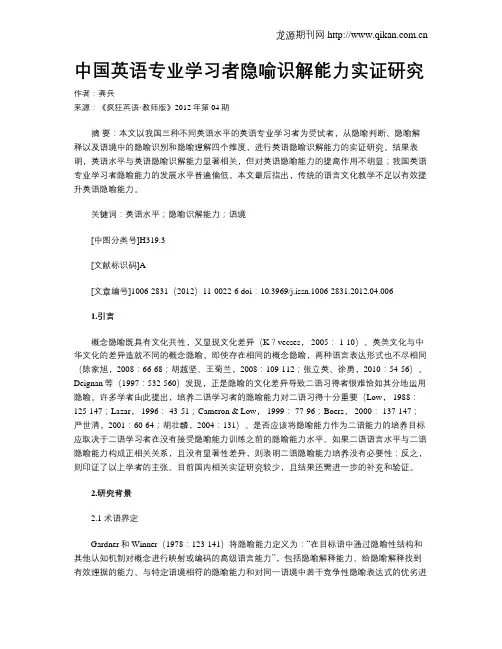
中国英语专业学习者隐喻识解能力实证研究作者:龚兵来源:《疯狂英语·教师版》2012年第04期摘要:本文以我国三种不同英语水平的英语专业学习者为受试者,从隐喻判断、隐喻解释以及语境中的隐喻识别和隐喻理解四个维度,进行英语隐喻识解能力的实证研究。
结果表明,英语水平与英语隐喻识解能力显著相关,但对英语隐喻能力的提高作用不明显;我国英语专业学习者隐喻能力的发展水平普遍偏低。
本文最后指出,传统的语言文化教学不足以有效提升英语隐喻能力。
关键词:英语水平;隐喻识解能力;语境[中图分类号]H319.3[文献标识码]A[文章编号]1006-2831(2012)11-0022-6 doi:10.3969/j.issn.1006-2831.2012.04.0061.引言概念隐喻既具有文化共性,又显现文化差异(K?vecses, 2005: 1-10)。
英美文化与中华文化的差异造就不同的概念隐喻,即使存在相同的概念隐喻,两种语言表达形式也不尽相同(陈家旭,2008:66-68;胡越坚、王菊兰,2008:109-112;张立英、徐勇,2010:54-56)。
Deignan等(1997:532-560)发现,正是隐喻的文化差异导致二语习得者很难恰如其分地运用隐喻。
许多学者由此提出,培养二语学习者的隐喻能力对二语习得十分重要(Low, 1988:125-147;Lazar, 1996: 43-51;Cameron & Low, 1999: 77-96;Boers, 2000: 137-147;严世清,2001:60-64;胡壮麟,2004:131)。
是否应该将隐喻能力作为二语能力的培养目标应取决于二语学习者在没有接受隐喻能力训练之前的隐喻能力水平。
如果二语语言水平与二语隐喻能力构成正相关关系,且没有显著性差异,则表明二语隐喻能力培养没有必要性;反之,则印证了以上学者的主张。
目前国内相关实证研究较少,且结果还需进一步的补充和验证。

外语词汇学习中隐喻方法的实验研究1 引言近年来,隐喻方法已经被广泛应用于外语词汇教学中,取得了良好的教学效果。
隐喻是一种常用的策略,可以为学生创造吸引人的语言环境,有助于学习者表达和理解英语。
因此,本研究旨在探讨采用隐喻方法对外语词汇学习的影响。
2 研究背景外语词汇是构成外语的基础,是学习外语的最基本要素。
Facebook以及Twitter等社交媒体把翻译工具变成一种现实可用的工具,这使得母语人士可以更容易学习一门外语。
这同时也使学习者面对学习词汇的巨大压力,因为他们需要记忆大量的词汇量。
隐喻方法被认为可以帮助学习者理解和记忆词汇,提高外语学习效果。
3 研究方法本研究根据不同类型的隐喻,采取了实验研究方法,探讨采用隐喻方法对外语词汇学习的影响。
实验以85位母语为汉语的初中学生为研究对象,他们学习英语作为语言课程,随机分为实验组和对照组,使用Dr. AI网校的阅读课程模式进行实验。
实验组使用隐喻法,对照组不使用。
在实验结束后,在学习效果上进行对比,测试学生的英语词汇量。
4 讨论本研究结果表明,采用隐喻方法进行外语词汇学习,学生的学习效果得到明显提高。
实验组学生在测试后记住的英语词汇比对照组学生更多,实验组学生答题正确率也明显比对照组高。
这表明,使用隐喻方法可以有效提高学习者词汇学习效果,更好地激发学生学习兴趣,增强对外语词汇的理解和记忆能力。
5 结论通过对词汇学习的实验研究,本文证明了采用隐喻方法可以提高外语词汇的学习效果。
隐喻方法可以帮助学生更容易理解和记住新词汇,同时培养学习者的逻辑思维。
虽然隐喻方法在外语学习中取得了良好的成果,但是未来在应用隐喻方法时还需要考虑教师经验、学习环境、学习方法等综合因素。
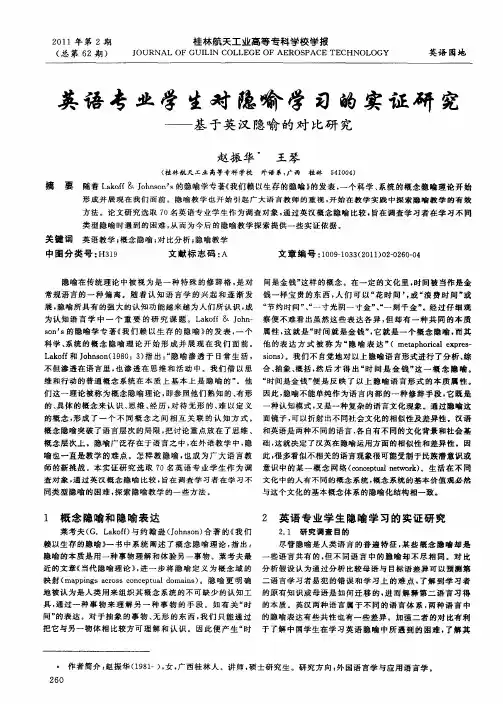

在华留学生隐喻能力与词汇认知水平的实证研究隐喻是一种常见的修辞手法,广泛应用于语言表达中。
然而,隐喻的理解和运用需要具备一定的词汇认知水平。
本研究旨在探究在华留学生的隐喻能力与词汇认知水平之间的关系,并为隐喻教学提供一定的参考。
本研究采用问卷调查的方法,以在华留学生为研究对象。
通过随机抽取样本,共收集了300份有效问卷。
问卷内容包括参与者的基本信息、词汇认知水平以及隐喻理解与运用情况。
研究结果显示,在华留学生的词汇认知水平与隐喻能力之间存在显著正相关。
具有较高词汇认知水平的留学生更容易理解和运用隐喻,而词汇水平较低的留学生则较难掌握隐喻的含义和运用方式。
进一步的分析表明,留学生的语言学习经验和学习动机对隐喻能力的影响较大。
在国内学习时间较长、接触中文环境较多的留学生,其词汇认知水平和隐喻能力更高。
此外,留学生对于学习中文的目标和动机不同,也会对隐喻能力产生影响。
那些对中文文化和语言感兴趣的留学生,通常拥有较高的隐喻能力。
本研究的结果对于隐喻教学具有一定的启示意义。
在华留学生在学习中文的过程中,应注重词汇的积累和理解,为提高隐喻能力打下基础。
同时,教师可以通过增加隐喻相关的教学内容,培养学生对隐喻的敏感性和理解能力。
此外,教师还可以鼓励学生参与相关的语言活动,如隐喻创作、隐喻解读等,以提高他们的隐喻运用能力。
总之,本研究探究了在华留学生的隐喻能力与词汇认知水平之间的关系,并发现二者之间存在显著正相关。
这一发现对于隐喻教学具有一定的指导意义。
教师可以根据留学生的词汇水平和学习动机,设计相应的教学策略,帮助学生提高隐喻的理解和运用能力。
中国英语学习者隐喻理解研究的开题报告
一、选题背景
隐喻在英语语言中占有重要地位,是英语表达中最为常见的修辞手
法之一,也是英语习得中难度较大的一部分,因此具有重要研究价值。
同时,中国英语学习者在隐喻理解方面也存在较大困难,需要深入研究。
二、研究目的和意义
本研究旨在探究中国英语学习者隐喻理解的特点和影响因素,进而
为英语教学和学习提供理论和实践指导。
通过对中国英语学习者隐喻理
解能力的研究,可以揭示不同语言背景和文化背景下隐喻理解差异的原因,从而找到有效的教学策略,帮助学生提高隐喻理解能力,促进英语
教育的发展。
三、研究内容和方法
本研究将从以下几个方面入手,分析中国英语学习者隐喻理解的研
究内容和方法:
1.隐喻的定义和类型,介绍隐喻在英语语言中的作用和特点。
2.前人对于中国英语学习者隐喻理解的研究成果,分析其存在的不
足和研究不足之处,制定新的研究方向。
3.通过实验和问卷调查的方式,收集数据分析中国学习者隐喻理解
的特点和影响因素,以及提高隐喻理解能力的有效方法。
4.根据研究结果,提出相关的英语教学策略和方法,为中国英语学
习者提高隐喻理解能力提供理论依据和实践参考。
四、预期成果
通过本次研究,预计可以得到以下三个方面的成果:
1.揭示中国英语学习者隐喻理解的研究现状和存在问题,为未来研究提供参考。
2.分析中国英语学习者隐喻理解的特点和影响因素,为教学提供针对性策略和方法。
3.为英语习得和文化交流领域提供理论支持,促进中西文化交流与理解。
隐喻应用于大学英语词汇教学的实证研究本文旨在研究隐喻知识对学生在大学阶段词汇水平的影响,用对比试验的方法分别在实验班和控制班使用两种不同的词汇教学法,利用对比两个组在词汇方面的掌握及隐喻对词汇量的影响数据,得出结果。
结果表明与控制班相比,实验班在词汇掌握方面有明显提高。
实验表明,作为对词汇教学的进一步完善,隐喻的融入是一个有效提高学生词汇的方法。
标签:隐喻;隐喻能力;词汇一、研究问题学生在未接受隐喻知识讲解和隐喻能力训练前,他们的二语词汇(本文中指的是英语词汇)形式和意义的彼此之間的链接主要依靠课堂的教与学和课上课下的自主学习。
英语词汇教学大纲和常规词汇教学并没有对词汇的隐喻意义和其本义进行有效地区分。
学生的英语词汇存储方式的基础不是隐喻认知,而是死记硬背。
Littlemore发现,英国大学教师用本族语授课时,经常使用隐喻表明自己对特定主题的态度,而英语为二语的学生,因无法准确解读这些隐喻而造成误判。
Danesi也发现,外语学习者可以达到较高水平的言语流利程度,但无法用二语概念图示进行思维。
二语学习者在接受大量二语隐喻语言时,其隐喻能力只停留在语言本身,没有形成隐喻思维能力。
基于以上问题,本课题就以下问题进行探讨:(1)隐喻判断和隐喻能力是否与词汇水平相关?(2)词汇水平对语境中隐喻理解有何影响?(3)学生具有什么样的隐喻能力?二、研究对象本课题的研究对象为新疆工程学院(以下简称“我校”)2013级化工系的两个自然班的学生。
一个班为实验班,另一个班为控制班,每班各50名学生。
两个班的学生学习背景相同——相同课时、相同教材、相同教师。
三、研究工具隐喻能力测试题四套,测试次数为四次。
第一套题的初试意在了解学生的隐喻判断能力;第二、三套题的目的在于观察学生经过一段时间的隐喻能力培养和隐喻学习,其隐喻判断能力是否有所提高,直接以学生断定句中词汇的隐喻的测试水平来看。
第四套题的设计增加了语境中隐喻的识别和隐喻理解的测试,主要是翻译工作。
中国英语学习者隐喻理解研究隐喻作为一种修辞手法,在语言中广泛存在。
英语中的隐喻使用尤为常见,然而,中国英语学习者在理解隐喻方面仍存在一定难度。
本文旨在探讨中国英语学习者对隐喻的理解现状及其影响因素,以期为英语教学提供有益启示。
本研究采用问卷调查和实验两种方法进行。
问卷调查对象为不同英语水平的中国英语学习者,旨在了解他们对英语隐喻的理解程度和难点。
实验部分则以大学生为实验对象,通过对比分析中国英语学习者与英语本族语者在隐喻理解上的差异。
实验设计为两组:对照组为英语本族语者,实验组为中国英语学习者。
所有参与者需完成一项包含隐喻理解题的实验任务。
实验数据的收集与分析将分别从反应时间、正确率、认知负荷等方面进行。
通过问卷调查,我们发现中国英语学习者在理解英语隐喻时存在一定困难。
其中,词汇和语境的匹配程度、文化背景差异以及二语习得水平等因素均对隐喻理解产生影响。
在实验环节,我们发现虽然中国英语学习者在隐喻理解上的正确率有所提高,但与英语本族语者相比,他们在处理隐喻时的反应时间较长,认知负荷较大。
英语水平对中国英语学习者隐喻理解的影响也较为显著。
本研究结果表明,中国英语学习者在理解英语隐喻时仍存在一定困难。
在影响因素方面,英语水平、语境和词汇的匹配程度以及文化背景等因素不容忽视。
二语习得过程中学习者的认知资源分配也是影响隐喻理解的关键因素。
与前人研究对比,本研究发现中国英语学习者在隐喻理解上的表现有所提高,这可能与英语教学中的针对性训练有关。
然而,与英语本族语者相比,他们在处理隐喻时的反应时间和认知负荷仍存在较大差距。
这提示我们,在今后的英语教学中,应更加注重培养学生的隐喻思维能力,提高他们对文化差异的敏感度。
本研究对中国英语学习者隐喻理解现状及其影响因素进行了探讨。
结果表明,中国英语学习者在理解英语隐喻时仍存在一定困难,英语水平、语境和词汇的匹配程度以及文化背景等因素均对其产生影响。
与前人研究对比,本研究发现中国英语学习者在隐喻理解上的表现有所提高,但仍需加强针对性训练。
高职商务英语专业学生隐喻能力研究的开题报告一、研究背景及意义隐喻是日常语言中常用的修辞手法,而商务英语作为一种特殊领域的英语语言,其中隐喻普遍存在且起着重要的作用。
因此,对于商务英语学生的隐喻能力提高及其影响因素进行探究,具有重要的意义。
现有研究表明,高职商务英语专业学生的英语实际应用水平较低,主要原因之一是语言表达能力不足。
而隐喻能力作为语言表达中的重要部分之一,其与语言表达能力的关系需要深入研究。
此外,商务英语的应用领域广泛,隐喻也在其中扮演着重要的角色。
因此,提高商务英语专业学生的隐喻能力,有利于其将来在工作中更好地进行英语交流。
二、研究问题及研究目标本研究主要探究高职商务英语专业学生的隐喻能力及其影响因素,研究问题为:高职商务英语专业学生隐喻能力的现状及影响因素是什么?本研究旨在:1.探究高职商务英语专业学生的隐喻能力现状和水平;2.分析影响高职商务英语专业学生隐喻能力的因素;3.探讨如何有效提高高职商务英语专业学生的隐喻能力。
三、研究方法及技术路线本研究采取问卷调查法和实验法相结合的方式进行。
首先,运用问卷调查法,对高职商务英语专业学生的隐喻能力现状进行调查,并通过数据的分析,得出学生隐喻能力的水平。
其次,运用实验法,对高职商务英语专业学生进行隐喻语言实验,以探究实际情境下学生的隐喻能力表现。
最后,通过分析问卷和实验数据,探讨学生隐喻能力的影响因素并提出有效的提高学生隐喻能力的方法和建议。
四、研究预期成果及可行性分析本研究预期成果是:深入了解高职商务英语专业学生的隐喻能力现状及其影响因素,提出有效的提高学生隐喻能力的方法和建议。
本研究可行性分析:隐喻能力的发展与语言环境息息相关,涉及到语言、文化等方面的知识,本研究可通过对受访学生的问卷调查和实验法进行实施,数据容易获得且具有代表性,可以对高职商务英语专业学生隐喻能力的研究提供可靠的依据。
高职英语专业教学中隐喻意识及能力培养的实践研究作者:华晓奕来源:《现代职业教育.高职本科》 2016年第11期[摘要]伴随我国经济社会的发展,社会对知识人才的需求量愈来愈大,我国的教育方式也在潜移默化中不断寻求着创新和突破。
随着世界多极化的逐步演变,英语在国际社会交流发展的重要地位日益显著,高职学校专业英语教学应该及时转变教育模式,注意学生隐喻意识的能力培养。
通过阐述“隐喻”在专业英语教学中的含义,揭示隐喻能力的本质,进一步对隐喻能力培养高职专业英语教学的实践进行研究,论述专业英语能力培养的方向和举措,希望可以为广大高职专业英语教育机构和工作者提供理论技术指导。
[关键词]高职英语专业教学;隐喻意识;能力培养[中图分类号]G712[文献标志码]A[文章编号]2096-0603(2016)31-0058-02专业英语学习涉及领域广泛,在专业学习过程中会接受到方方面面的理论指导,英语理论框架的建立过程需要不断调整自身的重点和学习方向。
隐喻意识在英语抽象思维学习中的应用为全面综合提升英语学习能力提供重要的支撑,在不断的试验和实践过程中取得了丰硕的教学成果。
隐喻能力的提升可以极大地提高英语专业能力,将所学理论知识贯穿于各个涉及领域,不断实现复合型、全才型高职专业英语人才的集中培养。
一、专业英语教学中的“隐喻”涵义(一)隐喻意识的本质对于“隐喻”一词的概念,从确立至今还没有进行统一。
但是,多数科学家的概念解释都具有一定的共通性。
“隐喻”一词从字面上看来具有一定的隐晦性,事实上也的确如此,隐喻被认为是一种人类潜意识中了解抽象事物的思维方式[1]。
通常人们在了解一个陌生的事物的时候,由于对事物的不熟悉,导致脑海中出现对事物进行抽象化理解的过程,理解过程具有抽象意象的成分。
在对陌生事物进行了解的过程中,人们通常会将从前了解的事物和眼前的新事物建立联系,用一种已知的解释去了解新事物,或者将从前的思维方法应用到新事物中。